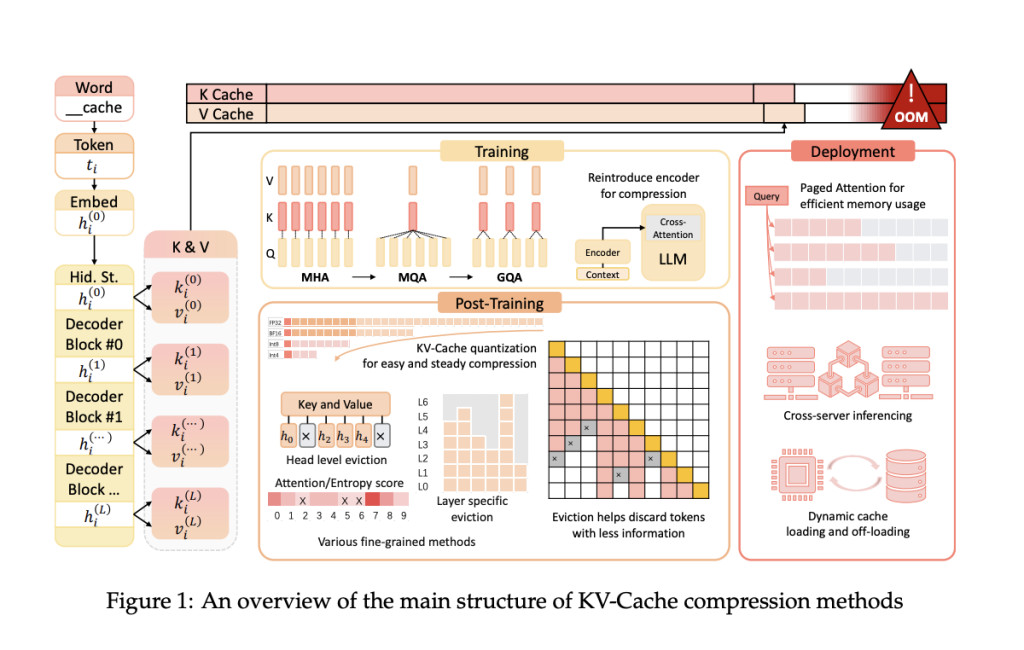Large Language Models (LLMs) are a subset of artificial intelligence focusing on understanding and generating human language. These models leverage complex architectures to comprehend and produce human-like text, facilitating applications in customer service, content creation, and beyond.
A major challenge with LLMs is their efficiency when processing long texts. The Transformer architecture they use has a quadratic time complexity, which increases computational load significantly, especially when dealing with extended sequences. This complexity poses a substantial barrier to achieving efficient performance, particularly as the length of text inputs grows. Addressing this challenge is crucial for the continued advancement and application of LLMs in real-world scenarios.
Researchers have introduced the KV-Cache mechanism to address this issue, which stores keys and values generated by past tokens. This reduces the time complexity from quadratic to linear. However, KV-Cache increases GPU memory usage, which scales with the conversation length, creating a new bottleneck. Current methods aim to balance this trade-off between computational efficiency and memory overhead, making it essential to optimize KV-Cache usage effectively.
The research team from Wuhan University and Shanghai Jiao Tong University introduced several KV-Cache compression methods. These methods optimize KV-Cache space usage across LLMs’ pre-training, deployment, and inference phases, aiming to enhance efficiency without compromising performance. Their approach includes modifying the model architecture during pre-training to reduce the size of the Keys and Values vectors by up to 75%. This adjustment maintains the advantages of the attention mechanism while significantly lowering memory requirements.
The proposed methods include architectural adjustments during pre-training, which reduce the size of generated Keys and Value vectors. During deployment, frameworks like Paged Attention and DistKV-LLM distribute KV-Cache across multiple servers to improve memory management. Post-training methods include dynamic eviction strategies and quantization techniques that compress KV-Cache without significantly losing model capabilities. Specifically, Paged Attention uses a mapping table to store KV-Cache discontinuously in GPU memory, minimizing fragmentation and improving inference speed. DistKV-LLM extends this by enabling distributed deployment across servers and enhancing large-scale cloud service efficiency.
The methods introduced have shown significant improvements in memory efficiency and inference speed. For instance, the GQA method used in popular models like LLaMA2-70B achieves better memory utilization by reducing the KV-Cache size while maintaining performance levels. These optimizations demonstrate the potential to handle longer contexts more effectively. Specifically, GQA reduces memory usage to a fraction of that required by traditional methods, achieving a 75% reduction in KV-Cache size. Furthermore, models using Multi-Query Attention (MQA) and GQA demonstrate improved throughput and reduced latency, crucial metrics for real-time applications. The research indicates that the LLaMA2-70B model’s per-token memory usage drops from 0.5MB to 0.125MB, showcasing a significant enhancement in efficiency.
The research provides comprehensive strategies for optimizing KV-Cache in LLMs, addressing the memory overhead issue. By implementing these methods, LLMs can achieve higher efficiency and better performance, paving the way for more sustainable and scalable AI solutions. The findings from Wuhan University and Shanghai Jiao Tong University offer a roadmap for future advancements, emphasizing the importance of efficient memory management in the evolution of LLM technology. These strategies not only mitigate current limitations but also open avenues for exploring more sophisticated applications of LLMs in various industries.
Check out the Paper. All credit for this research goes to the researchers of this project. Also, don’t forget to follow us on Twitter and join our Telegram Channel and LinkedIn Group. If you like our work, you will love our newsletter..
Don’t Forget to join our 47k+ ML SubReddit
Find Upcoming AI Webinars here
The post This AI Paper from China Introduces KV-Cache Optimization Techniques for Efficient Large Language Model Inference appeared first on MarkTechPost.
Source: Read MoreÂ


